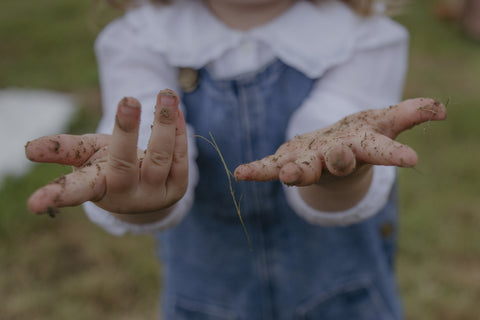For thousands of years, humans lived with a deep and intimate connection to nature. We looked to nature for food, shelter, guidance and healing, but somewhere along the way we became disconnected and lost.
From depression and anxiety to blood sugar issues, heart disease and metabolic health, research shows that the more disconnected we are from nature, the more likely we are to suffer with health problems. In the East, practices like Shinrin Yoku or ‘Forest Bathing’ are known to help calm the nervous system, reduce inflammation and improve immunity, whilst in the West, scientific studies continue to prove that simply spending time in nature has a positive effect on both physical and mental health.
At My Little Farm, we understand the power of nature; from a simple seasonal meal shared under the Summer sun, to gathering around the fire under the stars, there’s something undeniably healing about reconnecting to nature.
In this blog, you’ll learn – and perhaps simply be reminded – of simple yet significant ways nature can heal and support us on every level. And this Summer, whilst the days are warmer and longer, we encourage you to step outside and try them for yourself:
The Power Of Sunlight
Sunlight has been utilised as a healer for aeons. Formally, the concept of ‘Heliotherapy’ has been used since 1400BC, but used in a clinical setting since the beginning of the 20th century, involving the use of sunlight to heal everything from tuberculosis to skin issues, rickets, hormonal balance and hair growth. Just spending time in the sun is beneficial enough, but there are certain light waves present at different times of the day that can elicit specific benefits:
Sunrise: High in anti-inflammatory infra-red light waves, viewing morning sunlight is wonderfully beneficial for energy production, mood and hormonal health. When our eyes sense light upon waking, this sends a message to a part of the brain known as the suprachiasmatic nucleus (SCN), which then sends a message to the brain to tell it it’s morning and time to wake up. This triggers melatonin to be swept away, and beneficial levels of cortisol to enter the blood stream, as well as motivation-boosting dopamine, and the essential hormone precursor pregnenolone.
UVA Rise: Occurring a couple of hours after sunrise, UVA light is beneficial for boosting levels of focus, as well as enhancing mood. UV light exposure can improve mood through several mechanisms, including increased serotonin production, which is associated with mood elevation and feelings of calm.
UVB Rise: This is when the sun is at an angle that allows for vitamin D production. This type of light is known to be particularly beneficial for skin conditions like psoriasis, eczema, and vitiligo by reducing inflammation and promoting normal skin cell growth. UVB light is generally strongest in the middle of the day between 10am and 4pm.
Sunset: Another special time when the light waves are high in anti-inflammatory infra-red, sunset light can help reduce stress levels, improve mood and prepare the body for sleep by communicating to the brain that the day is ending. If you want to improve your sleep, try to get outside at sunset and watch the skies.
Grounding
You may have heard of grounding or ‘earthing’ and thought of it as a bit of a ‘woo woo’ concept, but there’s real science behind being barefoot on the earth. Benefits such as reduced inflammation, a calmer nervous system, improved immunity and lowered blood pressure all stem from a connection to the earth’s natural electrical charge. Grounding also appears to improve sleep, regulate the body’s circadian rhythms and reduce pain. There’s no set amount of time to practice grounding for, although studies show participants may begin to experience a reduction in pain signals after around 30 minutes, but even 5-10 minutes can help you feel calmer and more centred. Simply take off your shoes and give it a try.
Wild Swimming & Cold Water Therapy
Swimming in nature can be a breath-taking way to reduce stress and improve our sense of connection to the world around us. As well as being a proven way to positively impact mental health by boosting mood and overall wellbeing, wild swimming can also enhance our sense of resilience, as well as being a potential treatment for depression. Physically, swimming in natural cold water can help reduce pain and muscle soreness, enhance circulation, improve heart health, and increase energy metabolism. It’s important to find somewhere you can swim safely – there are plenty of wild swimming groups popping up all over the UK, so find one near you to start getting the benefits of cold water and community.
Seasonal Eating
If you know us, you know how passionate we are about seasonal eating and growing food; it’s what we do! Eating seasonally is incredibly beneficial on so many levels, from improving our sense of connection to nature and appreciation for each passing month of the year, to enhancing immune health. When we eat foods in season, the nutrients we obtain give us specific benefits that we need in that moment. Consuming lycopene-rich tomatoes in Summer for example, helps protect skin from sunburn, whilst making an elderberry cordial in Autumn can help protect us from seasonal viruses. Eating seasonally not only benefits us, but the world around us too. The less miles food has to travel before it reaches us, the less pollution we’re pumping into the air, and the more we’re taking ownership of our meals, healing ourselves and the world around us. Take a look at our ‘what’s in season?’ guides and our seasonal veg boxes for inspiration on what to eat now.
Phytoncides: Nature’s Perfume
Did you know that each tree and plant you pass is giving off a particular scent loaded with compounds that benefit physical, mental and emotional wellbeing. These scents are known as phytoncides. Phytoncides are part of how plants and trees naturally protect themselves from harmful insects and germs, and they provide benefits for us too. These natural chemicals emitted mainly from trees like pine, oak, birch and cedar have strong benefits on immune health and reducing inflammation, as well as improving mental wellbeing. Concentrations of phytoncides are strongest from June to September, so ensure you’re spending plenty of time out in the woods this Summer, or take a walk in our woodland here on the farm!
What are your favourite ways to let nature heal you? Do you have a particular practice or ritual rooted in nature? Try spending a little time connected to the outdoors this Summer and let nature work its magic on you.
Written by Emma Newlyn




Comments (0)
There are no comments for this article. Be the first one to leave a message!